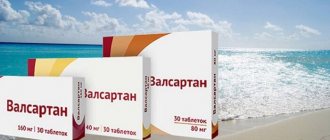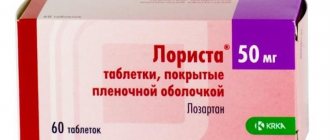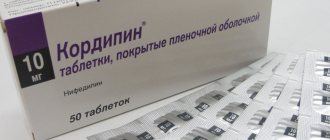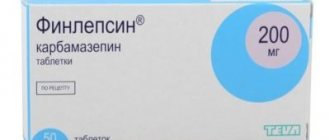Lokren
Monitoring of patients taking tablets should include monitoring heart rate and blood pressure (at the beginning of treatment - daily, then once every 3-4 months), blood glucose levels in patients with diabetes mellitus (once every 4-5 months). In elderly patients, it is recommended to monitor renal function (once every 4-5 months).
The patient should be taught how to calculate heart rate and instructed about the need for medical consultation if the heart rate is less than 50/min.
In approximately 20% of patients with angina, beta blockers are ineffective. The main reasons are severe coronary atherosclerosis with a low ischemic threshold (heart rate at the time of development of an anginal attack less than 100/min) and increased LV end-diastolic pressure, disrupting subendocardial blood flow. In smokers, the effectiveness of beta-blockers is lower.
Patients using contact lenses should take into account that during treatment the production of tear fluid may decrease.
In thyrotoxicosis, betaxolol may mask certain clinical signs of thyrotoxicosis (for example, tachycardia). Abrupt withdrawal in patients with thyrotoxicosis is contraindicated because it can increase symptoms. In diabetes mellitus, it can mask tachycardia caused by hypoglycemia. Unlike non-selective beta-blockers, it practically does not enhance insulin-induced hypoglycemia and does not delay the restoration of blood glucose concentrations to normal levels.
When taking clonidine concomitantly, it can be discontinued only a few days after stopping betaxolol.
It is possible that the severity of the hypersensitivity reaction may increase and the absence of effect from usual doses of epinephrine against the background of a burdened allergic history.
A few days before general anesthesia with chloroform or ether, you must stop taking the drug. If the patient took the drug before surgery, he should select a drug for general anesthesia with minimal negative inotropic effect.
Reciprocal activation of the n.vagus can be eliminated by intravenous administration of atropine (1-2 mg).
Drugs that reduce catecholamine reserves (for example, reserpine) can enhance the effect of beta-blockers, so patients taking such combinations of drugs should be under constant medical supervision to detect arterial hypotension or bradycardia.
Patients with bronchospastic diseases can be prescribed cardioselective adrenergic blockers in case of intolerance and/or ineffectiveness of other antihypertensive drugs, but the dosage should be strictly monitored. An overdose is dangerous due to the development of bronchospasm.
If elderly patients develop increasing bradycardia (less than 50/min), arterial hypotension (systolic blood pressure below 100 mm Hg), AV block, bronchospasm, ventricular arrhythmias, severe liver and kidney dysfunction, it is necessary to reduce the dose or stop treatment . It is recommended to discontinue therapy if depression caused by taking beta-blockers develops.
Treatment should not be abruptly interrupted due to the risk of developing severe arrhythmias and myocardial infarction. Cancellation is carried out gradually, reducing the dose over 2 weeks or more (reduce the dose by 25% in 3-4 days).
Use during pregnancy and lactation is possible if the benefit to the mother outweighs the risk of side effects in the fetus and child.
Should be discontinued before testing the content of catecholamines, normetanephrine and vanillylmandelic acid in the blood and urine; antinuclear antibody titers.
During the period of treatment with the drug, care must be taken when driving vehicles and engaging in other potentially hazardous activities that require increased concentration and speed of psychomotor reactions.
Pharmacodynamic characteristics - how they affect blood pressure
The drug Lokren has a pronounced hypotensive effect. Characterized by the presence of the following therapeutic properties:
- Suppression of adrenergic receptors;
- Moderately expressed membrane-stabilizing properties;
- Antiarrhythmic effect;
- Decreased heart rate;
- Reduced myocardial conductivity and its oxygen demand;
- Reduced force of blood ejection from the heart into the area of blood vessels;
Thanks to these properties, Lokren tablets have an antihypertensive effect and reduce blood pressure.
The medication begins to act within a few hours from the moment of use, and its hypotensive effect lasts throughout the day, which allows you to avoid frequent use of tablets.
The drug is not addictive and even prolonged use does not reduce its effectiveness.
Since Lokren tablets are characterized by a cumulative effect, the results of treatment become noticeable after approximately 1-2 weeks of the therapeutic course.
Packaging of Lokren tablets
Pharmacokinetic properties
The main active component of the tablets, when it enters the gastrointestinal tract, is quickly absorbed by 100%. The maximum concentration of the drug’s ingredients in the blood is observed after 2 to 4 hours from the moment of taking the blood pressure tablets.
The bioavailability of the drug is about 85%. In the liver it is transformed into inactive metabolites. It is eliminated from the user’s body using the renal apparatus along with urine. The half-life ranges from 15 to 20 hours.
If liver or kidney functions are impaired, this process increases in time by approximately 35%.
Is it possible during pregnancy and lactation?
Pregnancy is not an absolute contraindication to the use of Lokren blood pressure tablets. However, according to experts, drugs belonging to this pharmacological group disrupt the blood supply to the placenta, negatively affecting the development of the fetus. For this reason, expectant mothers are advised to use milder and safer medications that normalize blood pressure.
If the patient did take Lokren during pregnancy, a full comprehensive medical examination of the baby will be required immediately after birth. During the first week of a child’s life, he may experience such adverse consequences as hypoglycemia, tachycardia or bradycardia, arrhythmia. There is a possibility of developing vascular and bronchopulmonary pathologies.
Since the active components of Lokren tablets have the ability to pass into breast milk, during lactation it is necessary to either stop therapy or transfer the baby to artificial formula.
The drug is strictly contraindicated during breastfeeding
Release form and composition
Dosage form – film-coated tablets: round, biconvex, white, with “KE 20” engraving on one side and a dividing line on the other (14 pcs. in blisters, 1 blister in a cardboard pack).
The active substance of Lokren is betaxolol hydrochloride, 20 mg in 1 tablet.
Auxiliary components: microcrystalline cellulose, lactose monohydrate, sodium carboxymethyl starch (type A), magnesium stearate, colloidal silicon dioxide.
Film shell composition: macrogol 400, hypromellose, titanium dioxide (E171).
Possible side effects
Treatment of high blood pressure with the drug Lokren can cause the following side effects:
- Skin itching;
- Headache attacks;
- Allergic rashes on the skin like urticaria;
- Impaired coordination of movements;
- Nightmarish dreams;
- Insomnia;
- Depressive states;
- Decreased intraocular pressure;
- Asthenia;
- Excessive dryness of the mucous membranes of the visual organs;
- Paresthesia;
- Gastralgia;
- Nausea and vomiting;
- Stool disorders (constipation or diarrhea);
- Hyperglycemia;
- Bradycardia;
- Swelling;
- Excessive decrease in blood pressure (hypotonic crisis);
- Heart attacks;
- Bronchospasms;
- Erectile dysfunction in male patients.
In most cases, the adverse reactions listed above occur when the drug is abruptly discontinued or the dosage recommended by the doctor is exceeded.
How to take for high blood pressure and hypertension
Instructions for use of Lokren tablets recommend starting the therapeutic course with a starting dose of the drug of 10 mg throughout the day. Capsules should be taken whole, without first crushing or dissolving.
The exact dosage of the drug is determined by a medical specialist solely on an individual basis. In this case, the doctor takes into account factors such as the general health and age category of the patient, the stage of development of the pathological process, an accurate diagnosis, the possible presence of concomitant diseases and other features of a specific clinical case.
If there is no proper effectiveness after 1.5-2 weeks of treatment, the daily dose of the drug can be increased by 50% - up to 20 mg. The maximum permissible dosage of Lokren blood pressure tablets is 40 mg per day.
For pathologies of the renal apparatus, the dose of medication is determined based on the results of preliminary diagnostics. For mild manifestations, it is recommended to use the drug in a standard dosage.
If the signs of pathology appear quite clearly, the tablets are used in a dose not exceeding 5 mg throughout the day.
The duration of the therapeutic course is determined individually. In most cases, the drug is taken until painful symptoms are completely eliminated and stable blood pressure levels are achieved that meet the criteria for age norms.
The dosage of tablets is calculated by the doctor individually
Drug overdose
Exceeding the maximum permissible doses of the blood pressure drug Lokren can provoke the following alarming symptoms:
- Dyspnea;
- Signs of acute heart failure;
- Convulsive syndrome;
- Spasms of the respiratory organs;
- Fainting conditions;
- Cyanosis of the upper extremities;
- Extrasystole of the cardiac ventricle;
- Slowing the heart rate to critical levels;
- Heart rhythm disturbance (arrhythmia).
First aid for overdose consists of gastric lavage, inducing artificial vomiting, and taking sorbents.
Further treatment is symptomatic and is prescribed by a medical specialist on an individual basis. For bradycardia, Atropine is prescribed to normalize the pulse.
In the case of a hypotensive crisis, a sharp decrease in blood pressure, vasopressor medications are used.
If respiratory function is impaired or bronchospasms are present, the patient is prescribed bronchodilators.
Shortness of breath is one of the symptoms of overdose
Contraindications for use
Lokren for blood pressure is strictly prohibited for patients who have the following clinical contraindications:
- Bradycardia (slow heart rate);
- Shock state of cardiogenic nature;
- Metabolic acidosis;
- Individual intolerance and hypersensitivity to the ingredients contained in the tablets;
- The patient is a minor;
- Pheochromocytoma;
- Bronchial asthma;
- Severe form of pulmonary pathologies;
- Hypotonic disease (low blood pressure);
- Advanced form of Raynaud's disease;
- Cardiomegaly;
- Chronic form of heart failure occurring in the stage of decompensation;
- Sick sinus syndrome;
- State of anaphylactic shock.
Bronchial asthma is one of the contraindications to taking the medicine
In addition to absolute contraindications, the drug Lokren has relative restrictions on its use. These include:
- Diseases of peripheral arteries, due to high risks of disruption of blood supply and circulation;
- Chronic heart failure in the compensation stage - involves the use of tablets in minimal doses and constant monitoring of the patient’s condition;
- Renal dysfunction;
- Diabetes mellitus - during therapy it is necessary to constantly monitor blood glucose levels;
- Liver pathologies;
- Psoriasis - due to increased risks of progression of the pathological process.
The drug is prescribed with great caution to elderly people (65 years and older). Treatment of such patients must be carried out under strict medical supervision and requires regular monitoring of the elderly person’s blood pressure, pulse, and heart rate.
Pharmacological interaction
When combined with calcium channel blockers, synergistic reactions and a slowdown in heart rate are possible.
The simultaneous use of Lokren with MAO inhibitors enhances the effect of both medications. For this reason, a temporary break of 1-2 weeks should be taken between doses.
Amiodarone in combination with Lokren tablets leads to disruption of cardiac conduction and contractile functions of the myocardium.
The combination of the drug with cardiac glycosides can cause sudden cardiac arrest and death of the patient.
It is not recommended to take Lokren together with the drug Floctafenine, since such a combination has an extremely negative effect on the condition and functioning of the heart and blood vessels.
The combination of Lokren tablets with Sultopride increases the risk of developing bradycardia and slowing the heart rate.
The drug Lokren does not have very good compatibility with other medications. For this reason, in order to prevent dangerous consequences, a patient who regularly takes any medications must inform the doctor who prescribed Lokren tablets about this.









